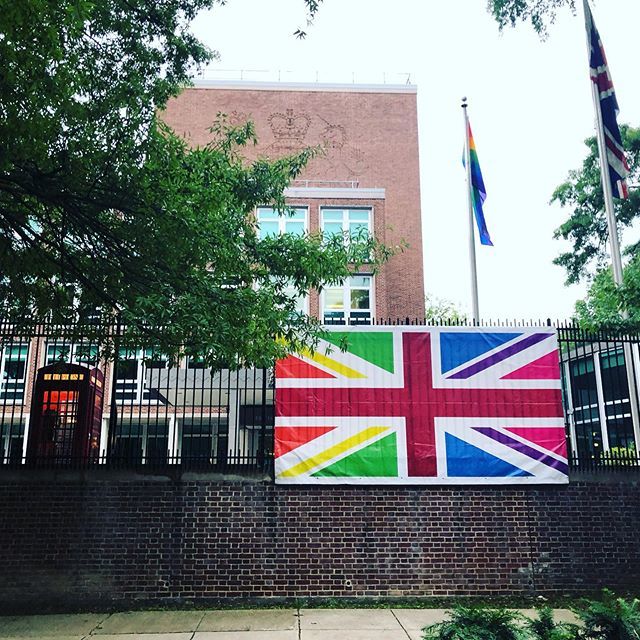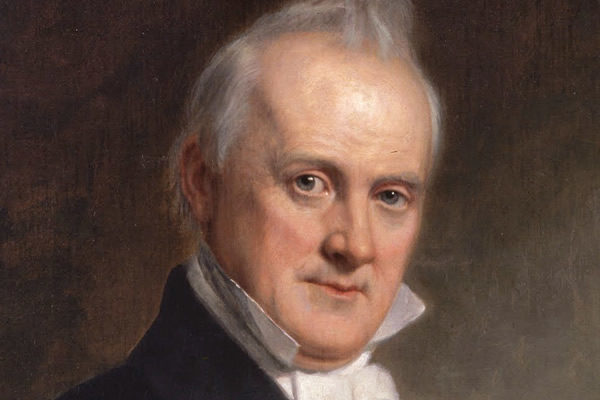Trump Admin Says Pride Flags Can’t Fly above U.S. Embassies, Sending a Clear Message to the World
U.S. embassies and consulates around the world aren’t allowed to raise LGBTQ pride flags on their flagpoles this month, the result of a policy change from the Trump administration. This decision, while perhaps not surprising given Secretary of State Mike Pompeo’s stance on LGBTQ equality, sends exactly the wrong message about America at a time when the world is already questioning our moral and political leadership.
In countries struggling with discrimination and oppression, a U.S. embassy is seen as a beacon — not of perfection, but of the continuing fight toward greater equality and opportunity. That shouldn’t stop in June, when countries around the world come together to celebrate the LGBTQ community and remember the advocates who fought and continue to fight for equality. Prior to joining NBC, I was a civil servant at the State Department and in 2016, when posted in Frankfurt, Germany, I was responsible for raising the pride flag in front of the consulate during Pride Month.
In countries struggling with discrimination and oppression, a U.S. embassy is seen as a beacon — not of perfection, but of the continuing fight toward greater equality and opportunity.
Earlier that summer, in the days after the Pulse nightclub attack in Orlando, several German towns planned vigils to honor the victims, and I attended as a symbol of gratitude for their solidarity. Together, we pledged that Germany and America would always fight back against the hatred that fueled the attack. A month later, raising the flag at the consulate was a continuation of that message.
Want more articles like this? Sign up here for our newsletter to get the best essays and analysis from THINK weekly
United States embassies have been flying the distinctive rainbow flags and engaging in Pride activities for years, but Washington didn’t dictate how it should be done. As with almost all public outreach abroad, experienced American diplomats and staff from the host country determine how to best convey our policies and values in a way that will resonate with communities in that country. They do this knowing that public support from the U.S. embassy can often move the needle on many issues overseas.
Related
NBC Out presents Pride50: LGBTQ people who are making the community proud
In other words, when an embassy makes the decision to raise the pride flag, it’s because the diplomats posted there believe doing so could have a genuine impact on the LGBTQ dialogue in their host country. The opposite is also true: A decision to stop flying the flag, after years of doing so, sends a clear and troubling signal to local communities. I trust our diplomats to know what’s best. And I would hope State Department officials in Washington would allow them to do their jobs.

JUST IN: @StateDept confirms our @NBCNews exclusive on US barring embassies from flying #pride flag on flagpoles. Spokeswoman Morgan Ortagus just now:
“The secretary has the position that as it relates to the flagpole that only the American flag should be flown there.”3191:06 PM – Jun 10, 2019Twitter Ads info and privacy329 people are talking about this
As NBC News first reported, although the embassies can’t raise pride flags on their flagpoles, they can still be hung in other places — on the building’s walls or inside. But diplomacy is all about symbolism and messaging, and no longer allowing pride flags on the U.S. flagpoles is sending the world the wrong message about our values.View image on Twitter


It feels like the British Embassy is giving the biggest middle finger to Trump this weekend. #Pride http://bit.ly/2XyuPyl 7691:56 PM – Jun 8, 2019111 people are talking about thisTwitter Ads info and privacy
In some countries, American diplomats are able to engage freely and actively in the local community. In others, our embassies are surrounded by tall walls, and security concerns severely limit what diplomats can do and where they can go. Yet in all of these countries, even above the walls, the U.S. flag is instantly recognizable for the many things it stands for. When the pride flag appears below it, the message of American values and LGBTQ tolerance are unmistakably intertwined.
Recommended
JUSTICE DEPARTMENTNew details of Barr’s far-reaching probe into ‘spying’ on Trump 2016 campaign
DONALD TRUMPTrump waves a single sheet of paper that he claims holds secret Mexico deal
In Trump’s tweets to honor Pride, he said we must “stand in solidarity with the many LGBTQ people who live in dozens of countries worldwide that punish, imprison, or even execute individuals…on the basis of their sexual orientation.” What better way to stand with people in those countries than by visibly showing it at our embassies? Not all American ideals can be clearly communicated in a flag. But when we have one that works — and that’s been working for years — why not use it?

Donald J. Trump✔@realDonaldTrump
As we celebrate LGBT Pride Month and recognize the outstanding contributions LGBT people have made to our great Nation, let us also stand in solidarity with the many LGBT people who live in dozens of countries worldwide that punish, imprison, or even execute individuals….140K12:12 PM – May 31, 2019Twitter Ads info and privacy73.1K people are talking about this
The U.S. is not an equal society, and it has a long way to go before it can truly call itself one. But one of the things that sets us apart from other countries is our ability and willingness to have hard conversations when we need to — conversations that honor how far we’ve come, while talking openly about what we still have yet to do. LGBTQ equality is a perfect example of this ongoing process, and even the pride flag itself is symbolic of the LGBTQ community’s continuing need to be more inclusive of people of color.
The U.S. evolution on LGBTQ equality is rocky and ongoing, but our discussion of it is also honest. We have the potential to lead many countries by example — but only if we continue our tradition of starting the conversation. Embassies should be allowed to use the position of American leadership for good. They should be able to raise the pride flag.





